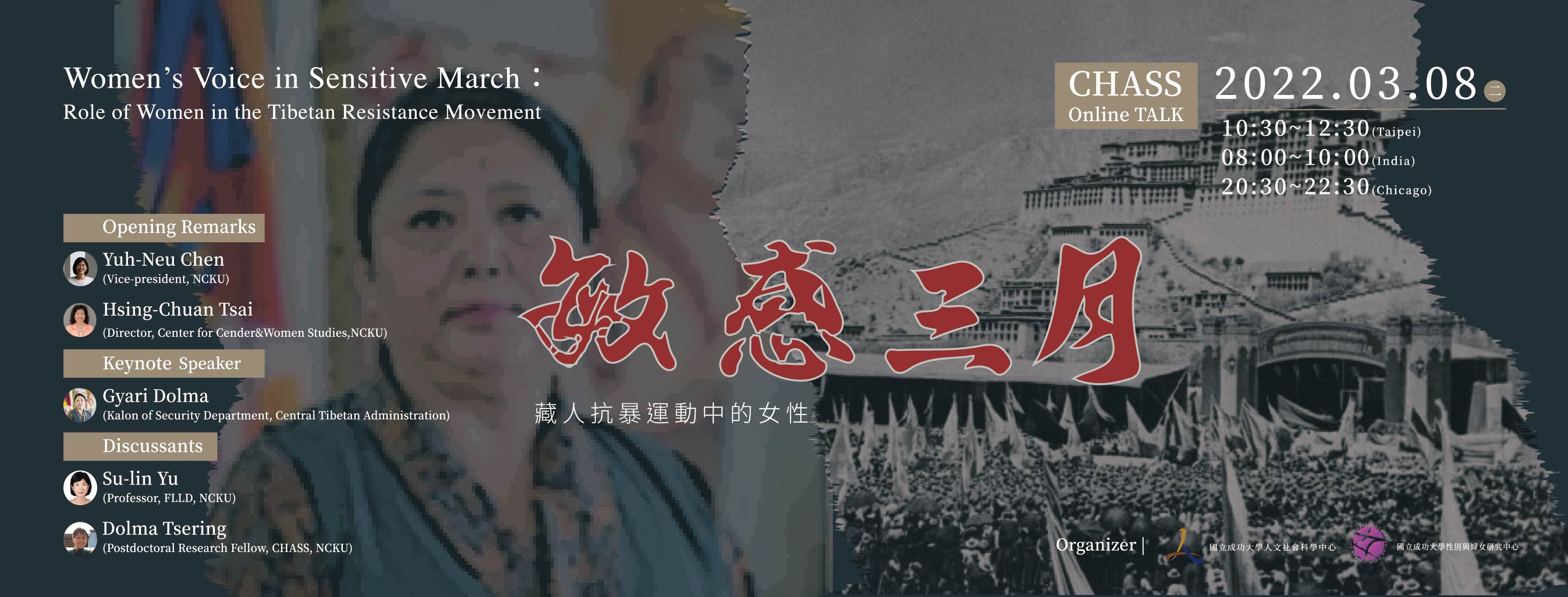敏感三月——藏人抗暴運動中的女性

【講座資訊】
主題|敏感三月——藏人抗暴運動中的女性
主講|Gyari Dolma (Kalon of Security Department, Central Tibetan Administration)
與談|游素玲 (Professor, FLLD, NCKU)、Dolma Tsering (Postdoctoral Research Fellow, CHASS, NCKU)
時間|2022年3月8日(週二)上午10:30~12:30
地點|線上座談
主辦單位|國立成功大學人文社會科學中心、國立成功大學性別與婦女研究中心
報名連結|前往報名
※本次線上會議使用「Cisco Webex」軟體,建議於活動前下載,與熟悉操作介面。
※主辦單位將於活動三日前以E-mail寄發線上會議室連結
※主辦單位保有修改、變更及取消活動之權利
【內容介紹】
人文社會科學中心和性別與婦女研究中心邀請藏人行政中央安全部部長嘉日卓瑪(Gyari Dolma),於3月8日國際婦女節當天,與我們分享藏人抗暴運動中的女性經驗。
檢視西藏與中國間的紛擾歷史,「三月」一直是個敏感的月份。1959年3月10日,久居高原地的藏人群起對抗中國軍隊的入侵,在解放軍鎮壓此次暴動後,西藏女性緊接著於3月12日發動第二場維護西藏主權的抗暴。最終,中共以其軍事力量接連鎮壓了兩場抗爭,進而導致許多西藏人紛紛向印度流亡。
1959年並非藏人女性最早的起義,事實上,她們一直都站在抗爭運動的最前線。中國最初從東邊入侵西藏時,西藏東部的婦女不得不投入對抗中國的戰役,緊張多變的情勢也促使女性結盟,組成了西藏婦女協會,與所有人一同肩負起抗爭的責任。流亡他國後,女性在抗爭運動中的角色從政治參與擴展至其他方面,亦成為孩童教育與文化保存等議題的重要推手。
儘管西藏女性在諸多方面皆扮演重要角色,她們的貢獻卻仍經常受公眾論述忽略。在流亡藏人社群中的女性同樣必須面對維繫家庭關係與擔負社會責任之間的衝突,她們面臨的挑戰與其它由男性主導的社群並無二致。
本場座談會的主講者嘉日卓瑪部長將講述1950年代的西藏抗暴運動,以及她的祖母和母親領導藏人女性對抗中國入侵的故事。嘉日卓瑪部長與藏人社會運動有著密切關係,她也將於本次對談中不藏私地講述她的經歷,與我們分享藏人女性在對抗中國的不同時代裡,遇到了哪些困難,身在臺灣的我們,在這「敏感三月」,又能從中得到哪些反思。
Kalon (Minister) Gyari Dolma
Kalon Gyari Dolma is currently serving as minister of security, the Central Tibetan Administration which was previously known as the Tibetan government in exile. From 2011– 2016, she served as Minster of Home in the 14th Kashag (executive body) of the exile government. At the age of 26, she became the youngest Tibetan to be elected as member of the parliament in exile. She also served as the deputy speaker of the Tibetan Parliament-in-Exile, the highest position held by a Tibetan woman in the history of Tibet. In 2011, she became the first women to join the race for presidential election of the exile government.
Kalon Gyari Dolma is also well known for her grass root activism focuses on women rights, human rights in Tibet and promotion of gender equality. She served as one of the the executive members of the Tibetan Youth Congress and also an advisor to Tibetan Women Association in Dharamshala.
Women’s Voice in Sensitive March: Role of Women in the Tibetan Resistance Movement
The month of March is observed as a “sensitive march” in the history of the China-Tibet conflict. On March 10th, 1959, Tibetan across the plateau revolted against the Chinese military infiltration in Tibet. After People's Liberation Army suppressed the first revolt, on March 12, Tibetan women launched the second protest to safeguard the sovereignty of Tibet. The military might of Communist China successfully suppressed these two protests and forced many Tibetan to flee Tibet and seek refuge in India.
The 1959 uprising was not the first time, Tibetan women had been in the frontline of the resistance movement. When China started the invasion of Tibet from eastern Tibet, the women in eastern Tibet were forced to take an arm and led the battle against China. The growing volatile situation in Tibet also led to the formation of the first women association called the Tibetan women association that committed to equal responsibilities in the Tibetan resistance movement. After coming into exile, the role of women in the resistance movement expanded beyond political involvement. Women's leadership in providing education for children, preservation of culture plays a pivotal role in the strengthening Tibetan resistance movement.
However, this does not ignore the fact that even though women had played an equally important role in the resistance movement, their contribution has frequently experienced negligence in the public discourse. The exile Tibetan society is not different from many male-dominated societies, where women face the same challenge of maintaining a balance between household and leadership commitment.
In this talk, we invite Kalon (minster) Gyari Dolma whose involvement in the Tibetan resistance dated back to 1950 when her grandmother led the battle against the Chinese invasion. She is associated with the resistance movement in different capacities as highlighted in her short introduction.
【講座流程】
| 10:20-10:40 | 入場簽到 Registration |
|
| 10:40-10:50 | 開場致詞 Opening Remarks |
|
| 10:50-11:20 | 主講 Keynote Presenter |
|
| 11:20-11:40 | 學者對談 Discussants |
|
| 11:40-12:00 | 問答時間 Q&A |